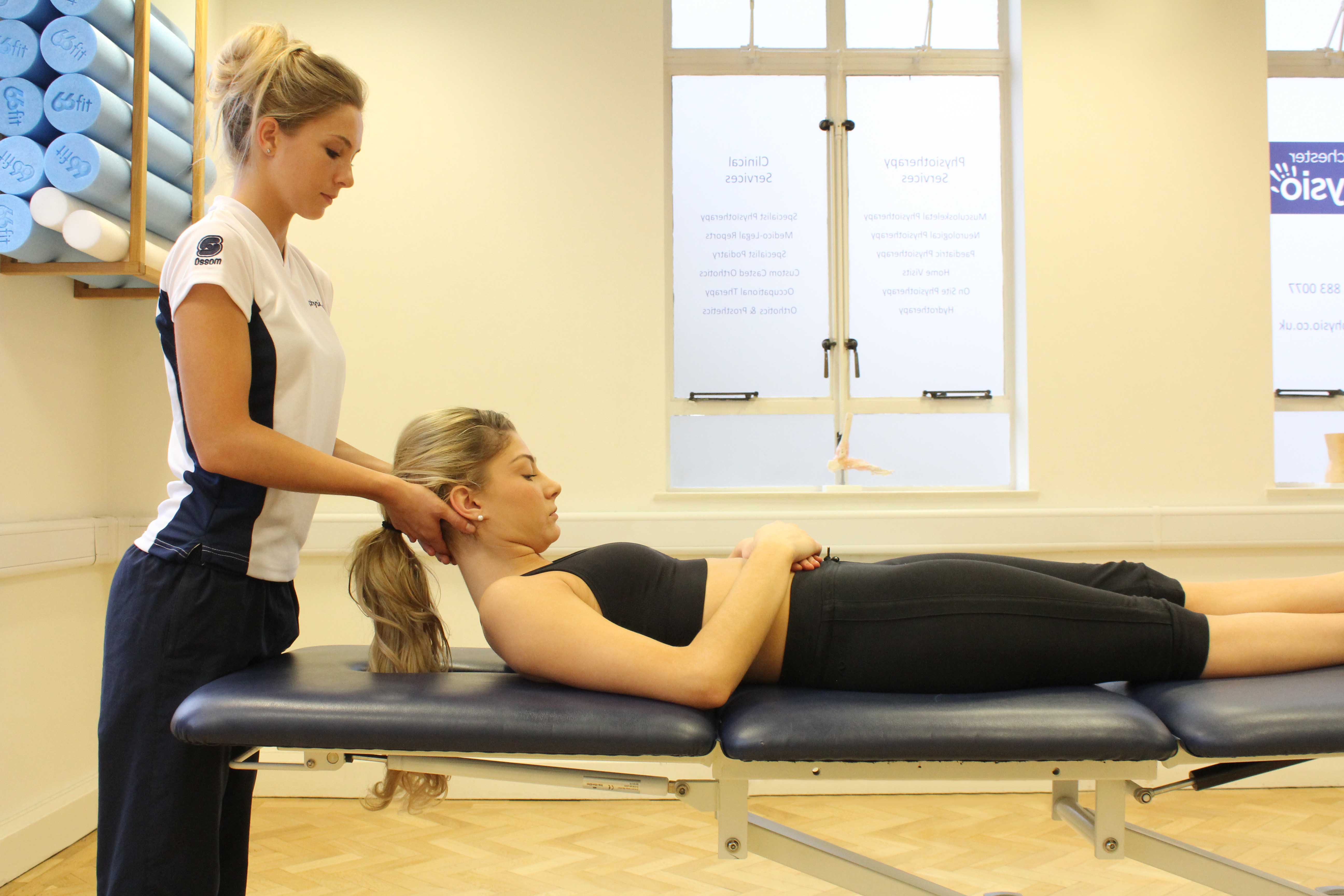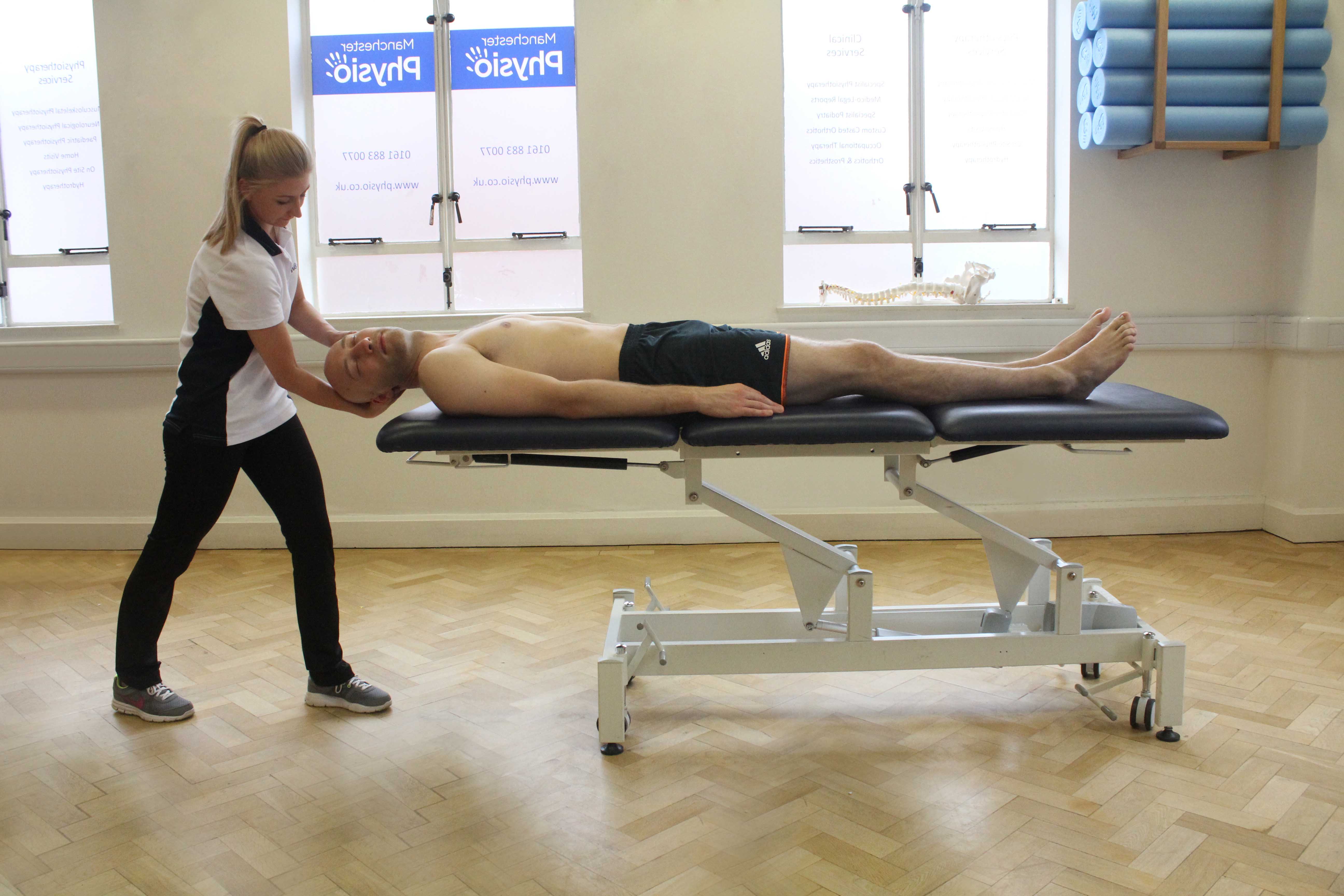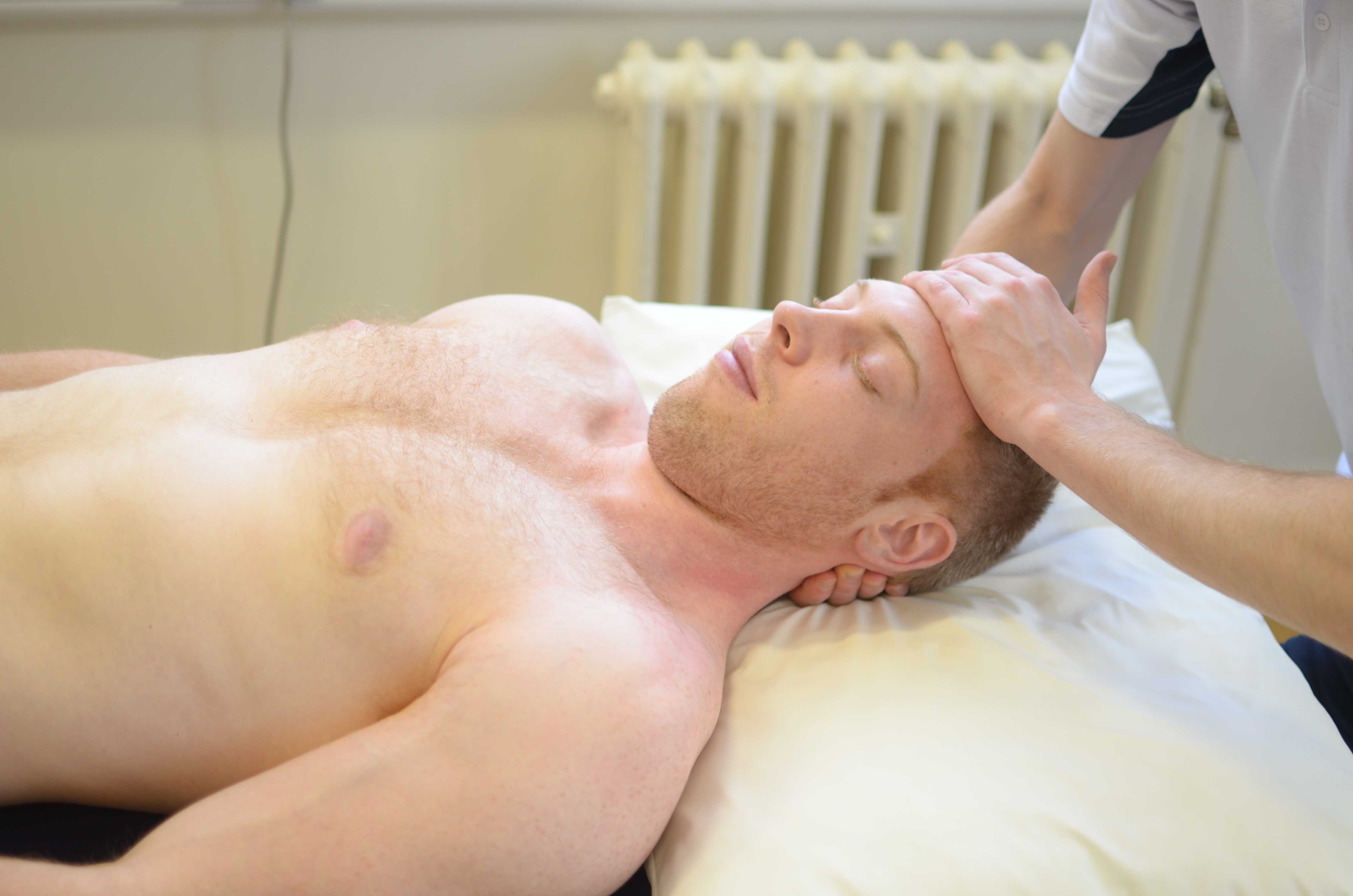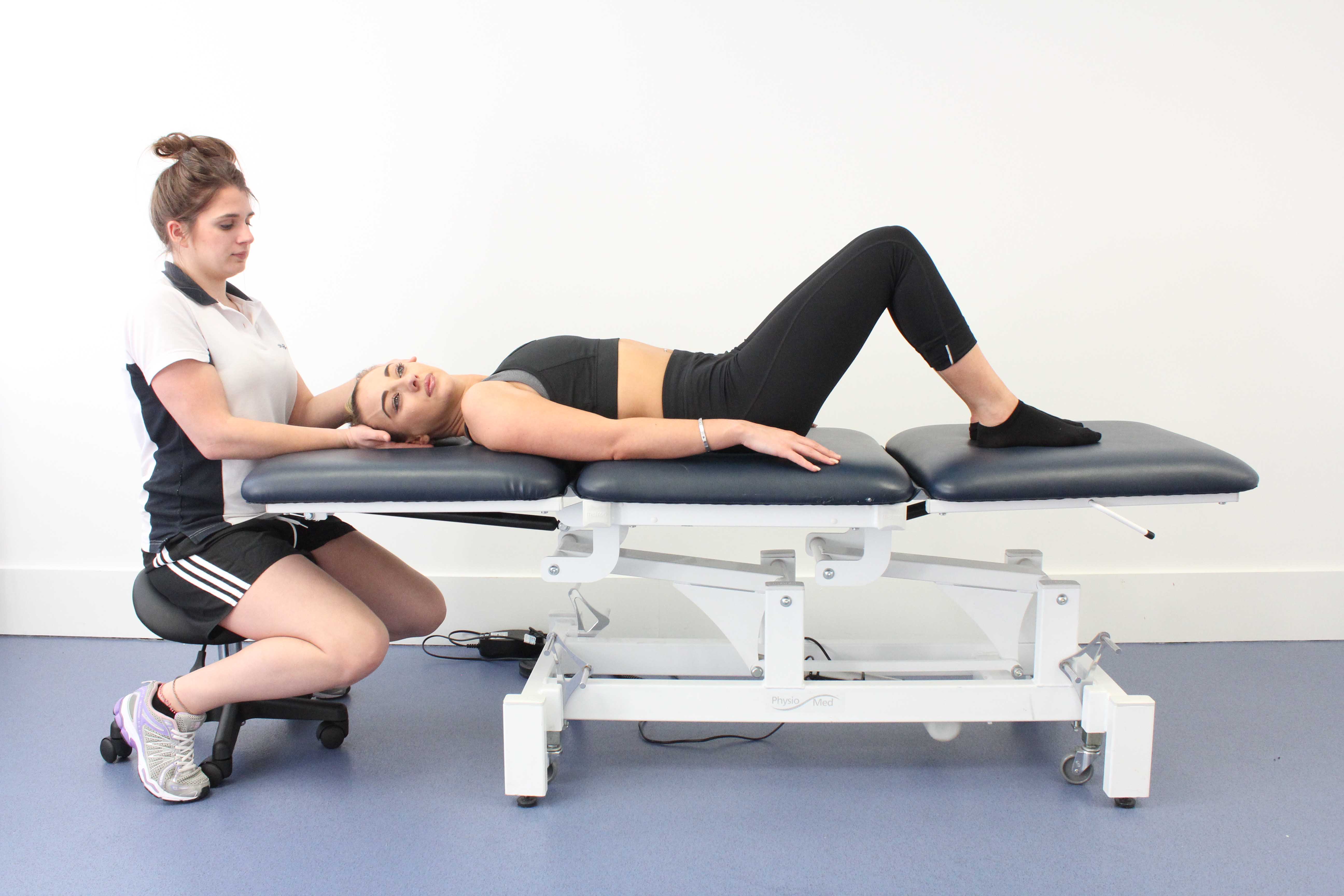What is dizziness?
Dizziness is a physical unsteadiness, imbalance, and light-headedness associated with balance and other disorders. Physiotherapy is an effective way to treat dizziness.?
What can cause dizziness?
Dizziness can be caused by a number of problems. These can be divided into two categories; vestibular (dizziness arising from the middle ears) and non-vestibular (dizziness caused by structures other than the middle ears).
Balance is dependent on information from three different sources in the body - the eyes, the muscles and joints, and the vestibular system (the inner ears).
 Above: Vestibular realignment exercises to correct dizziness conducted by specialist therapist
Above: Vestibular realignment exercises to correct dizziness conducted by specialist therapistVestibular dizziness
Each inner ear, or labyrinth, contains the vestibular organs. These organs function like the body’s natural three dimensional spirit level.
When the inner ears on both sides of the head are functioning properly, the balance information coming from the right side matches that coming from the left side. If the two sides produce conflicting information, dizziness is caused.
- Benign Positional Paroxysmal Vertigo - The most common form of vestibular dizziness is Benign Positional Paroxysmal Vertigo, also known as BPPV. BPPV causes severe dizziness caused by movements of the head and can, therefore, be very disruptive to your life. Dizziness is particularly severe when looking upwards or rolling over in bed. BPPV is caused by an accumulation of debris within 1 or more of the canals in the inner ear. When the head is moved this debris can shift causing false balance signals to be sent to the brain.
- Other causes of vestibular dizziness are; head trauma, labyrinthitis, vestibular neuronitis, otitis media, Meniere's disease and endolymphatic hydrops.
 Above: Vestibular realignment exercises to correct dizziness conducted by specialist therapist
Above: Vestibular realignment exercises to correct dizziness conducted by specialist therapistNon-vestibular dizziness
Dizziness can also be caused by structures other than the vestibular system, including;
- Cervical spine (neck) – A large number of individuals experience pain and stiffness in the neck combined with dizziness or unsteadiness. If the small neck muscles are in spasm they will provide false balance information to the brain. Treatment to the neck usually resolves the pain, stiffness and dizziness.
- Conflicting sensory input – At times the sensory information we receive from one source can conflict with the information from other sources. Motion sickness is caused by conflicting sensory input. For example, if standing still next to a large moving object, you may get the sensation that you are moving when you are not. This sensation can cause you to become unsteady or feel dizzy.
- 'Mal de debarquement' -This is an unusual type of motion sickness, which can occur after a boat trip. Mal de debarquement is where the feeling of still being at sea continues on dry land. For some, the sensation worsens and can take months to resolve.
- Visual Vertigo - Visual disturbances can cause light-headedness or dizziness. Some people feel dizzy if the prescription of their glasses is changed, or from cataracts causing reduced vision. You may also experience dizziness in crowds, bright lights, cinema etc. These situations with confusing visual stimuli can cause dizziness due to an increase in sensitivity to visual inputs. This sensitivity can often be secondary to a vestibular problem such as BPPV.
- Stress, tension, or fatigue can cause dizziness. These can cause the balance system to become less efficient. This causes a less automatic reflex control of balance.
- Hyperventilation can cause dizziness. During rapid breathing, more carbon dioxide than normal is expelled and the level of carbon dioxide in the blood falls, which in turn affects the function of brain cells. This dizziness is temporary.
- Reduced blood flow to the brain can cause dizziness. This is because oxygen is carried by the blood cells so if blood flow is reduced then not enough oxygen reaches the brain cells. A reduction in blood flow to the brain can be caused by low blood pressure upon suddenly standing up, dehydration, and narrowing of the blood vessels.
- There are also numerous other conditions that can cause dizziness
 Above: Postural exercises to correct vestibular inbalance abd dispell symptoms of dizziness
Above: Postural exercises to correct vestibular inbalance abd dispell symptoms of dizzinessPhysiotherapy for dizziness.
Physiotherapy for dizziness is called vestibular rehabilitation. Treatment varies depending on the cause of your dizziness.
Physiotherapy has a very high success rate in treating dizziness in many individuals. 90% of individuals with BPPV will be cured within 3 treatments. There are numerous different treatment techniques but the most common treatment is the ‘Epley Manouvre’. This works to reposition the build up of debris in the canals of the inner ear.
If the vestibular system is not functioning correctly then an individual’s balance and their ability to maintain posture can become dependent on visual stimulus or the information received from the muscles and joints.
This dependence can lead to individuals developing new patterns of movement to compensate for the reduction in function of the vestibular system. Individuals also tend to avoid any head movements that may aggravate the symptoms of dizziness and nausea.
Individuals with reduced balance often develop secondary symptoms due to these new patterns of movement, such as headache, neck ache, muscle stiffness, general fatigue, and a reduction in the ability to retrain the brain to adjust to the vestibular problem, hence making the dizziness much worse. Physiotherapy can also help with these secondary symptoms.
Vestibular rehabilitation is exercise based and works by retraining the brain to recognise and process signals from the vestibular system in coordination with information from the eyes, muscles and joints.
 Above: Physiotherapist performing postural realignment exercises to correct vestibular balance and dizziness conditions
Above: Physiotherapist performing postural realignment exercises to correct vestibular balance and dizziness conditionsOther physiotherapy treatments for dizziness include: To arrange a physiotherapy appointment for dizziness email office@physio.co.uk or call 0330 088 7800.

 0330 088 7800
0330 088 7800


































